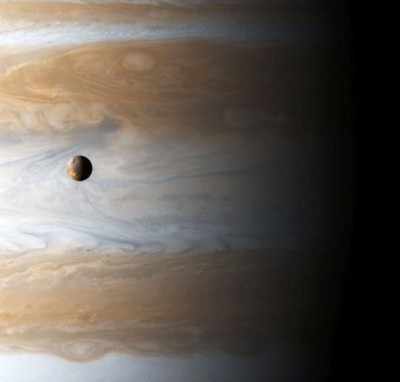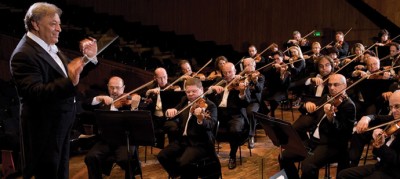
A weekend for orchestral bigness
If you want to go big in orchestral repertoire, this is your weekend to stop by the Knight Concert Hall. Begin with the Cleveland Orchestra, which wraps its Miami residency on Friday and Saturday nights with Gustav Holst’s The Planets, accompanied by NASA high-definition video.
As technology has made visual dreams of all kinds possible in the past couple decades, the classical music world has seized on this to exploit the possibilities of video. And so you have orchestral tours of video game music, in which the composers of these scores arrive with images in tow so that the reason for the music’s existence can be appreciated anew.
But when Holst wrote The Planets in 1914, there were no such possibilities (and Pluto, which has been downgraded since, was six years away from discovery), and it was left to the listener’s imagination to see the great red spot of Jupiter, the rings of Saturn and distant, frigid Neptune as Holst summoned them up in late Romantic fashion. It is by far Holst’s best-known piece, which is a shame because he is an underrated composer generally, and more attention to his output would be welcome.
Still, The Planets is a masterpiece of English 20th-century music, a brilliant score that uses the instruments of the orchestra with surpassing skill and power. The NASA video, which the Houston Symphony commissioned from filmmaker Duncan Copp and brought to the area in its Florida tour a few seasons back, is stunning, and many other orchestras have presented these images along with Holst’s music since then.
Giancarlo Guerrero will lead the orchestra (and the women of UM’s Frost Chorale) in the work. Also joining him on the program will be the British percussionist Colin Currie, who will be the soloist in the Percussion Concerto of the contemporary American composer Jennifer Higdon, who wrote the work for Currie.
Higdon is one of the most important composers writing today, not just because she is a prominent woman composer in a field long dominated by men, but also because her music has proven to have wide appeal to audiences. She has done percussionists a great service by writing something substantial and popular for them, and performances of it on YouTube abound (here’s one).
The concerts will open with the overture from Mozart’s great German opera Die Entführung aus dem Serail (which, come to think of it, is long overdue for a reappearance on our opera stages). The concerts are set for 8 p.m. both nights at the Knight Concert Hall. Call 305-949-6722 or visit www.clevelandorchestramiami.com.
Zubin Mehta and the Israel Philharmonic Orchestra.
Bruckner’s Eighth: Although Holst’s The Planets has its own strong English sound and derivation — one of its tunes was set to words as I Vow to Thee My Country — it is well within the tradition of the giant late Romantic orchestral piece, when composers expanded an ensemble that had been 45 to 50 players in the days of Beethoven to double that by the time Gustav Mahler and Richard Strauss began setting pen to paper.
Writing at the same time was the Austrian organist and composer Anton Bruckner, who was 40 years older than Mahler and Strauss, but who in his later years created the massive orchestral structures that have come to be seen as uniquely Brucknerian.
The most popular of his symphonies include the Fourth and the Seventh, but on Sunday, the Israel Philharmonic under the direction of Zubin Mehta presents the Eighth, composed beginning in 1884 and finally performed at the end of 1892.
Like all of Bruckner’s orchestral pieces – his choral works are a different story – the Eighth is massive, a work that lasts about an hour and an half and contains all the hallmarks of this singular composer’s style: derivations from Beethoven and Wagner, great contrasts between the various sections of the orchestra, and a deliberate pace in which there is a kind of religious reverence over the music. Bruckner was a devout Catholic from a remote rural area who would interrupt his teaching at the Vienna Conservatory in mid-class to sink to his knees and pray when the bells of the city’s great churches would sound.
His music is not to everyone’s taste, but performances of Bruckner are quite rare in South Florida, and especially of works such as the Eighth, his last completed symphony (he died in 1896 with the Ninth unfinished). It promises to be one of those quasi-mystical events for concertgoers looking for something unusual, and the Israel Philharmonic, a frequent South Florida visitor, is more than up to the task of conveying this composer’s distinctive message.
The concert starts at 8 p.m. Sunday. Call 305-949-7622 or visit arshtcenter.org.
Recent Content
-
Artsarticle ·
-
Artsarticle ·
-
Artsarticle ·


